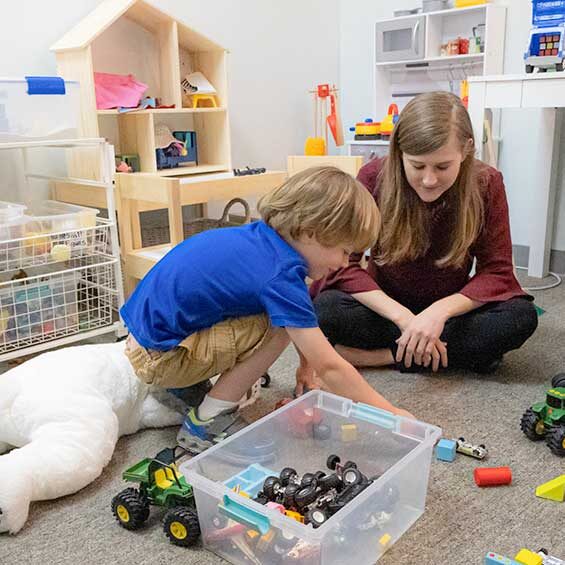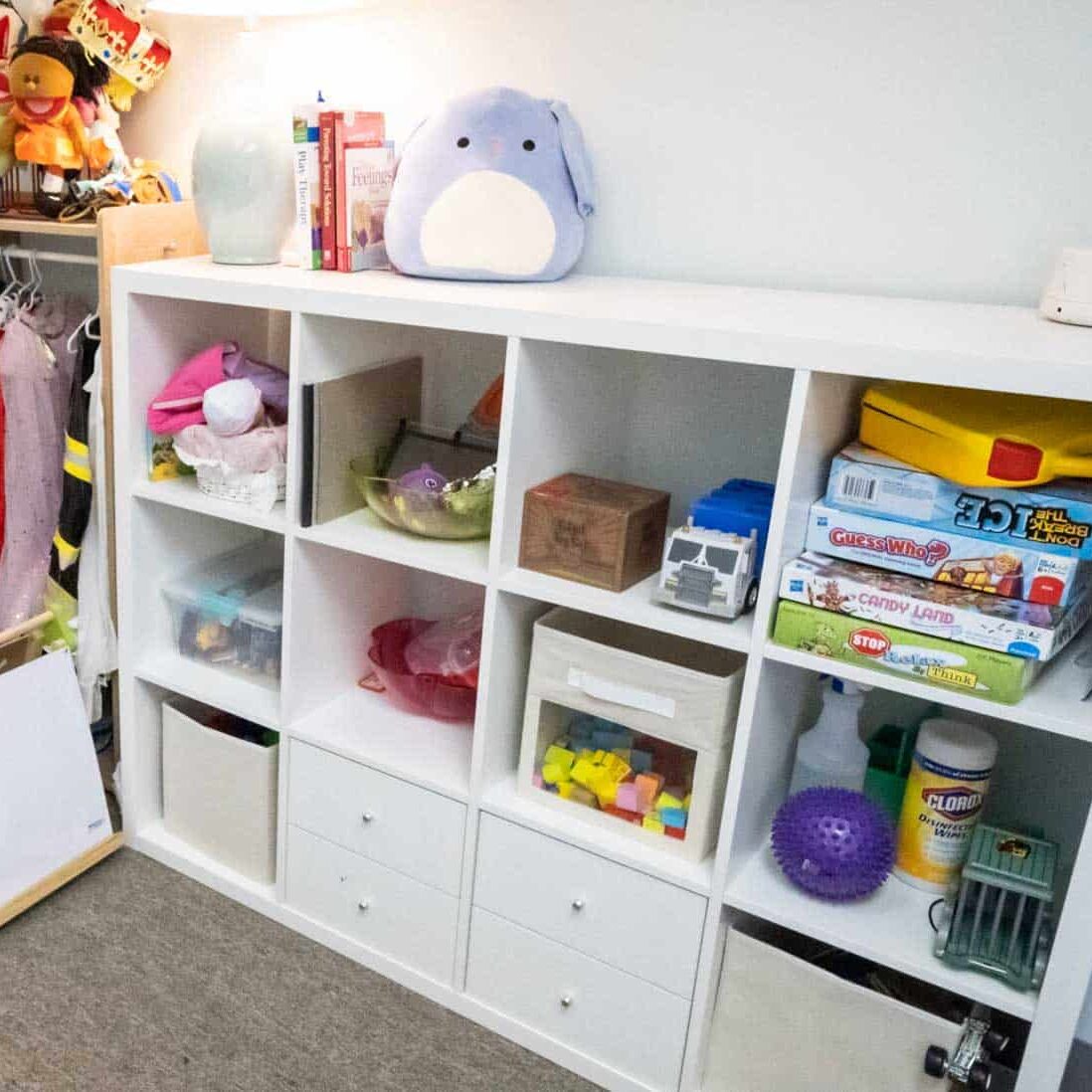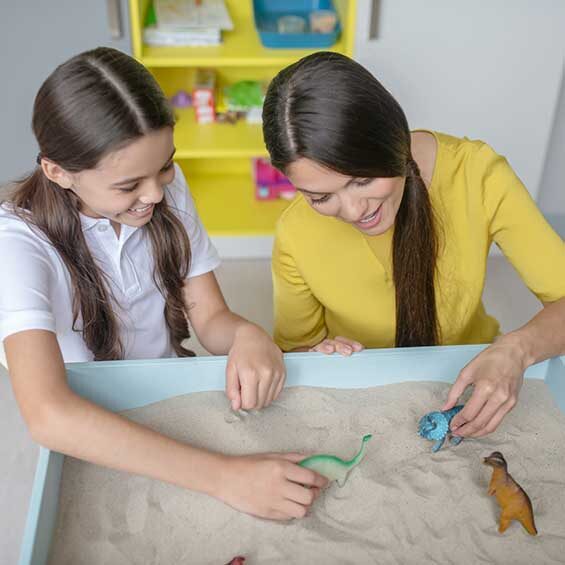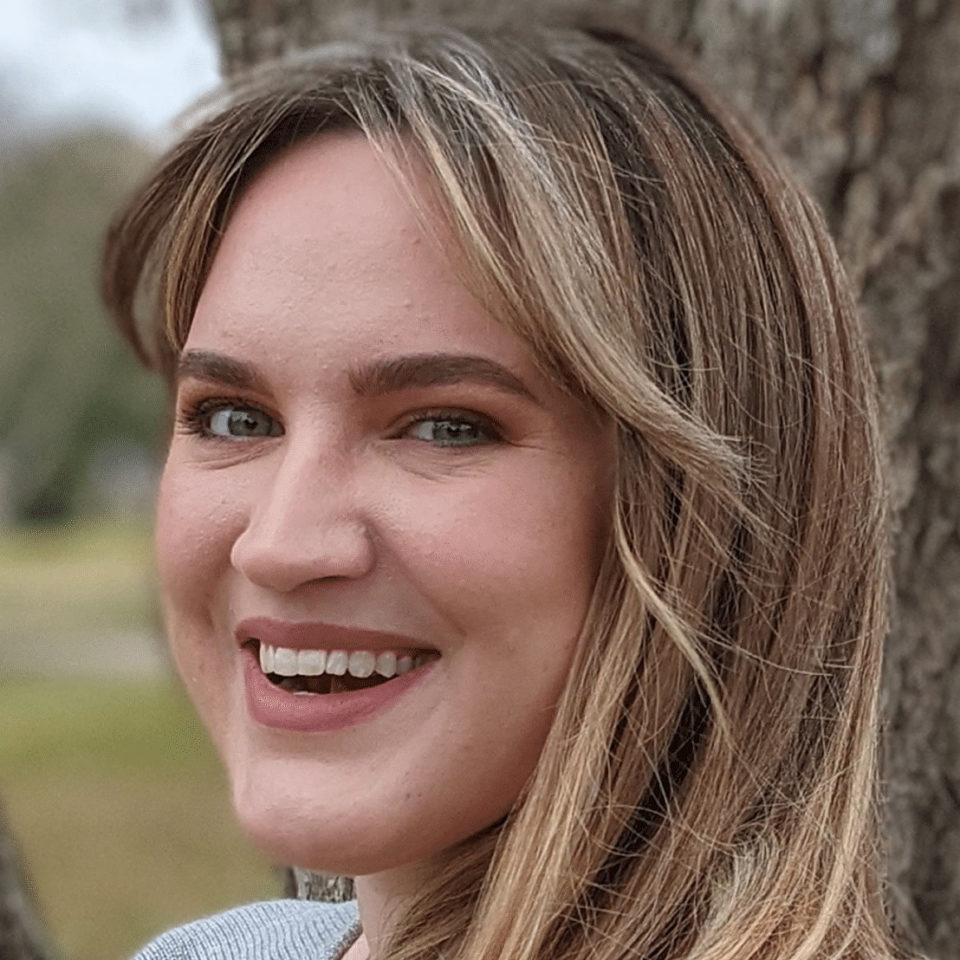
Play Therapy for Children
in Houston, TX and Online
What Is Play Therapy for Children?
Play is a natural activity of learning, exploration, and communication for children. Play therapy takes advantage of this innate ability to help children explore their feelings and thoughts, express themselves, and understand their life experiences. In essence, it helps them to play out what they may otherwise find difficult to put into words. Depending on the needs of the child, therapeutic play can encompass a variety of specific approaches. Child-Centered Play Therapy is the most widely practiced and evidence-based approach of play therapy in the United States. It was developed by Virginia Axline in the 1940s, which distinguishes this modality as one of the longest-standing mental health interventions in use. Play therapy is a sensible, research-supported, and developmentally-based child counseling approach to helping children cope with and overcome the problems they experience in the process of living their lives. The younger a child is when they begin play therapy, the more malleable their brain structure will be. This makes it easier to build neural pathways that lead to healthy emotional regulation, well-being, and adaptive behavior as they mature into happy, well-adjusted, and functional adults.

Who Can Benefit From Play Therapy?
Generally, the appropriate range for play therapy for children is 2-12 years old, but older children with cognitive or developmental delays may also benefit.
Play therapy creates a safe environment and allows for kids to open up and explore what they need to work on. It has proven to be an effective therapeutic method for a variety of children’s problems including, but not limited to, the following areas:
- Psychological issues – anxiety, grief and loss, communication barriers, shyness, stress, dissociation and schizophrenia, emotional disturbances
- Behavioral problems – anger, aggression, acting out, poor motor coordination, ADHD, self-harming, enuresis and encopresis
- Educational obstacles – poor organizational skills, poor planning and execution of tasks, bullying, disabilities (autism spectrum disorder, sensory impairment, intellectual impairment, deaf and physical challenges, chronic illness)
- Responses to family and relationship difficulties – family violence, abuse and neglect, trauma, parental separation or divorce, attachment disorders
Mild issues may resolve in 6-12 sessions while complex issues may take up to 48 sessions to resolve. But every child is different in terms of the amount of time they need to heal, change, and learn new adaptive skills. Multiple factors impact a successful outcome, such as consistency of visits, parental involvement, and reinforcing skills at home.


Is Play Therapy Real Child Therapy?
Yes, and play therapy works!
Play therapy is a research-based, proven counseling method of working with young children. It is not an approach based on guess, trial and error, or whims of the play therapist. According to Garry Landreth, one of the renowned play therapists of our time, the toys are the words and the play is the language that children use to express their thoughts and feelings.
This may also include role-playing type scenarios, such as when a child is working on social skills.
Developmentally, children can’t process things the way adults do. Play is how they work through their issues.
Their brains know where they want to go and how to reach a balance. As the child interacts with the play therapy toys in the room, the therapist processes the interactions with them to help them learn and reach their treatment goals.
While the therapist provides structure and guidance, it is the child’s instinct that leads them to a place of healing.
The power of play therapy for kids is demonstrated clearly when treating children whose behavior may be extreme, to the point where parents have lost all hope. For example, we have worked with a child who had severe anger and harming behaviors, such as running out in the street, biting, and more. After 5-6 months of play therapy, the child no longer exhibited any of those behaviors.


Helping Your Child Now Can Have an Impact on Their Future
As mental health professionals and child psychologists, we see the impact of children’s issues on adults. It used to be that, as a society, we didn’t recognize this impact, but now we know how crucial early intervention is.
We want to make sure that these resources are available for children and families, whether that means intervening on a mental health issue or a grief and loss, transition, or trauma situation. It’s important to us that we provide interventions and techniques to help children while they are still young, resilient, and malleable to set them up for success as adults.
When we realized the immense benefits play therapy for children provides to the social and emotional health of children, we added this modality to our therapy toolkit.
Throughout the years, we have worked with children, teens, and families in many capacities—schools, early intervention programs, families in crisis, children’s divorce groups, grief groups, children and adults with autism spectrum disorders, etc. During this time, we have also studied different methods of play therapy to stay current on the newest research and development in this field.
How Do Play Therapy Sessions Work?
Play therapy for children is about accepting the child for who they are and not looking at them as a problem. Rather, the focus is on trying to understand where they are at and what they need in that moment in their life.
As noted before, children use play as their primary form of communicating thoughts, feelings, values, and perceptions. They learn through hands-on activities. The various toys in the play therapy room are designed to allow for expression of specific emotions and needs that they don’t necessarily have the language for. A play therapist is specially trained in how to read beyond the surface of the child’s play so they can interpret that language and provide tailored support to the child and parents.
Our goal in session is to help your child resolve their social, emotional, behavioral, and developmental difficulties over time or to learn new behaviors and skills to cope with challenges. As they play out negative thoughts and emotions, they don’t need to act them out anymore.
Generally, children over the age of seven quickly start to understand how to take new coping skills they learned in therapy and use them in the real world.


Child-Centered Play Therapy FAQ's
For the first session, we ask you (the parents) to come in without your child being present so you can discuss your concerns with the therapist. This helps us to get a thorough understanding of what’s going on with your child—their needs, home life, external factors, etc.
During the second counseling session, we start working directly with your child in an independent play therapy session.
In general, we start out with Child-Centered Play Therapy to assess your child’s individual situation. Then, we integrate other variations of play therapy that fit your child’s specific therapeutic needs.
For example, we may employ the use of Sand Tray Play Therapy to help them communicate their emotions. Or perhaps your child learns most effectively through reading developmentally appropriate books concerning specific issues (this is known as bibliotherapy), or they might express themselves best through art therapy.
And depending on your child’s age, mindfulness techniques, journaling, or using feelings charts can be extremely helpful in relieving stress and anxiety.
Play therapy goes much deeper than a typical parenting class or education. Parental involvement is the key to success! We work in partnership with you in the treatment process as you are ultimately the experts on your child. The play therapist will let you know how your child is manifesting symptoms in the playroom and give you tips on how to address challenging behaviors at home as well as reinforcing skills learned during your scheduled parent session.
Typically, we will meet with parents after 3-4 play therapy sessions. However, you may request a brief check-in conversation at any time.
Depending on the specific needs of your child, we may also involve other partners—such as a speech therapist, occupational therapist, pediatrician, teachers, or neuropsychologist. We collaborate with these other providers to ensure we are delivering the best care for your child, and only with your permission.
Our child therapists provide play therapy services for children ages 3 and older.
Your Child Can Thrive
If you are ready to help your child overcome challenges that have been holding them back, we invite you to call Eddins Counseling Group in Houston, TX at 832-559-2622 or schedule an initial appointment with one of our play therapists to discuss your child’s needs.
Support for Parents
Motherhood Support Group
Our Motherhood Support Group is an excellent way to reconnect with yourself and others mothers to create the community and support you need to flourish.
Parenting Skills Support Group
If you have a young child ages 3-10, our parent support group may be helpful for you. This group utilizes an evidence-based parent education program that helps parents build stronger relationships with their children.
In 10 weeks, you will learn skills and strategies to help you:
- Be more attuned to your child’s emotional needs and developmental changes
- Help your child develop self-control and regulate their emotions
- Effectively discipline & limit inappropriate behavior
- Communicate more effectively with your child
- Feel closer and more connected to your child
Get Help From a Specialist in Play Therapy for Children
Jessie Blakely
Jessie has over 10 years of experience working with children, adolescents, young adults, parents, and families. She specializes in a range of ne…
BOOK AN APPOINTMENTJoey Harmon
Joey offers therapeutic services for everyone aged 3 and up and strives to provide a judgment-free environment for you or your child to learn an…
BOOK AN APPOINTMENTLizz Calderon-Mullens
I work with children, adolescents, families, and young adults to help with anxiety, depression, spiritual, and relational concerns.
BOOK AN APPOINTMENTMaggie Burkett
Maggie enjoys working with children, teens, and adults experiencing trauma, anxiety, depression, abuse, PTSD, self-harm, etc. Maggie is also a c…
BOOK AN APPOINTMENTRae Morris
Worried child? Teen angst? Therapist Rae Morris can help your family replace the worry lines with laughter. Rae is a therapist who is passionate…
BOOK AN APPOINTMENTTiara Runyon
Tiara offers a collaborative approach, fit to suit your individual needs. Her experience includes working with those facing life transitions and…
BOOK AN APPOINTMENTWhat Clients Are Saying
Phenomenal
My therapist is truly a phenomenal therapist and a huge asset to the Eddins team! She is an excellent listener, asks thoughtful questions to help me dismantle my thoughts to a greater degree, and was constantly looking for the best tools and resources to provide me with. She was always patient, understanding, and at times appropriately asked difficult questions that enabled me to reach a depth of processing that helped in me healing and growth. Her genuine interest in me and my life was apparent (always professional) and I always felt valued as a patient. I have recommended her to everyone that has mentioned to me they’re looking for a therapist. I know therapy is about “the work I put into it” but she truly has helped me become my best self and I’m eternally grateful for her and would not be in this great of a place mentally and emotionally without her.























